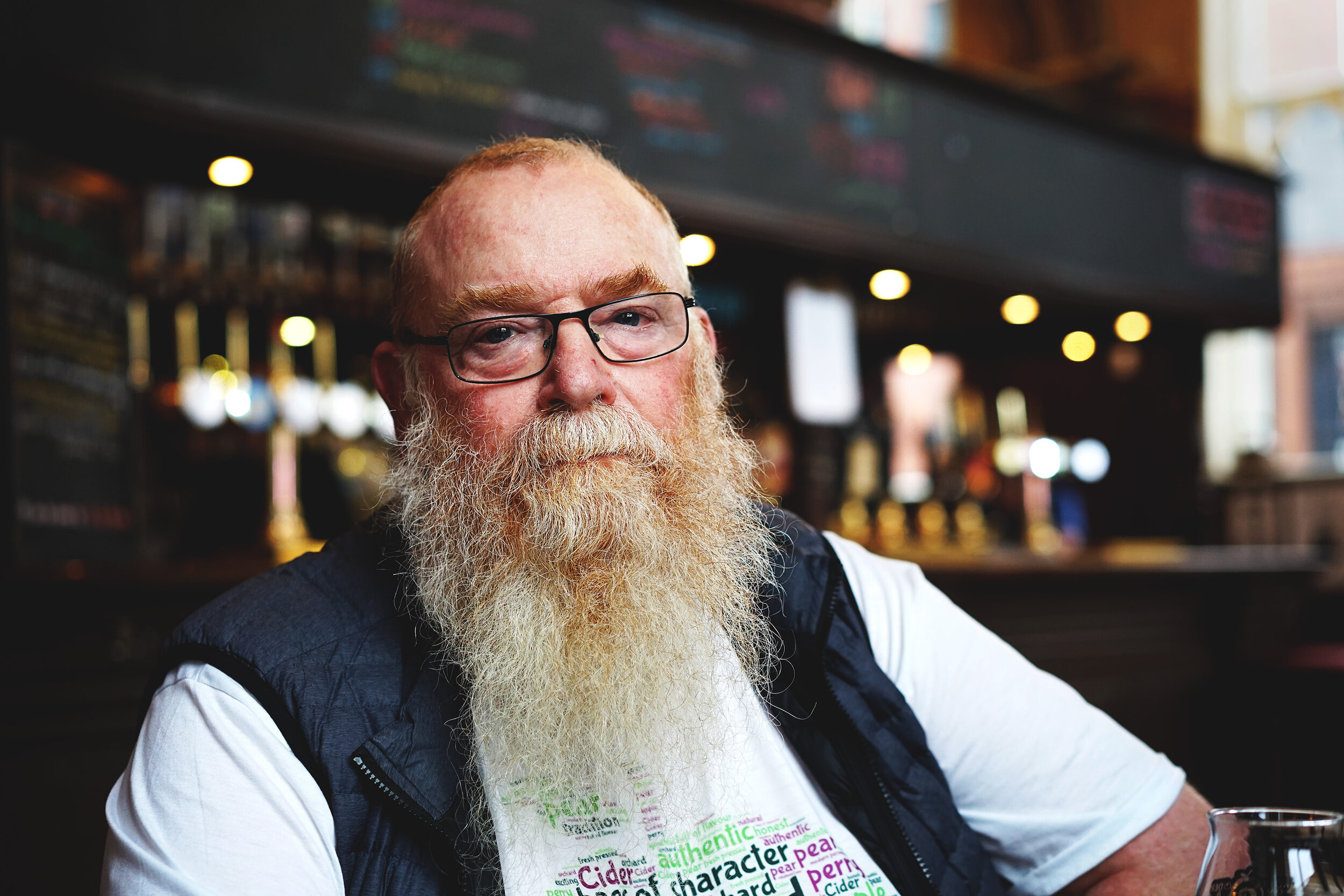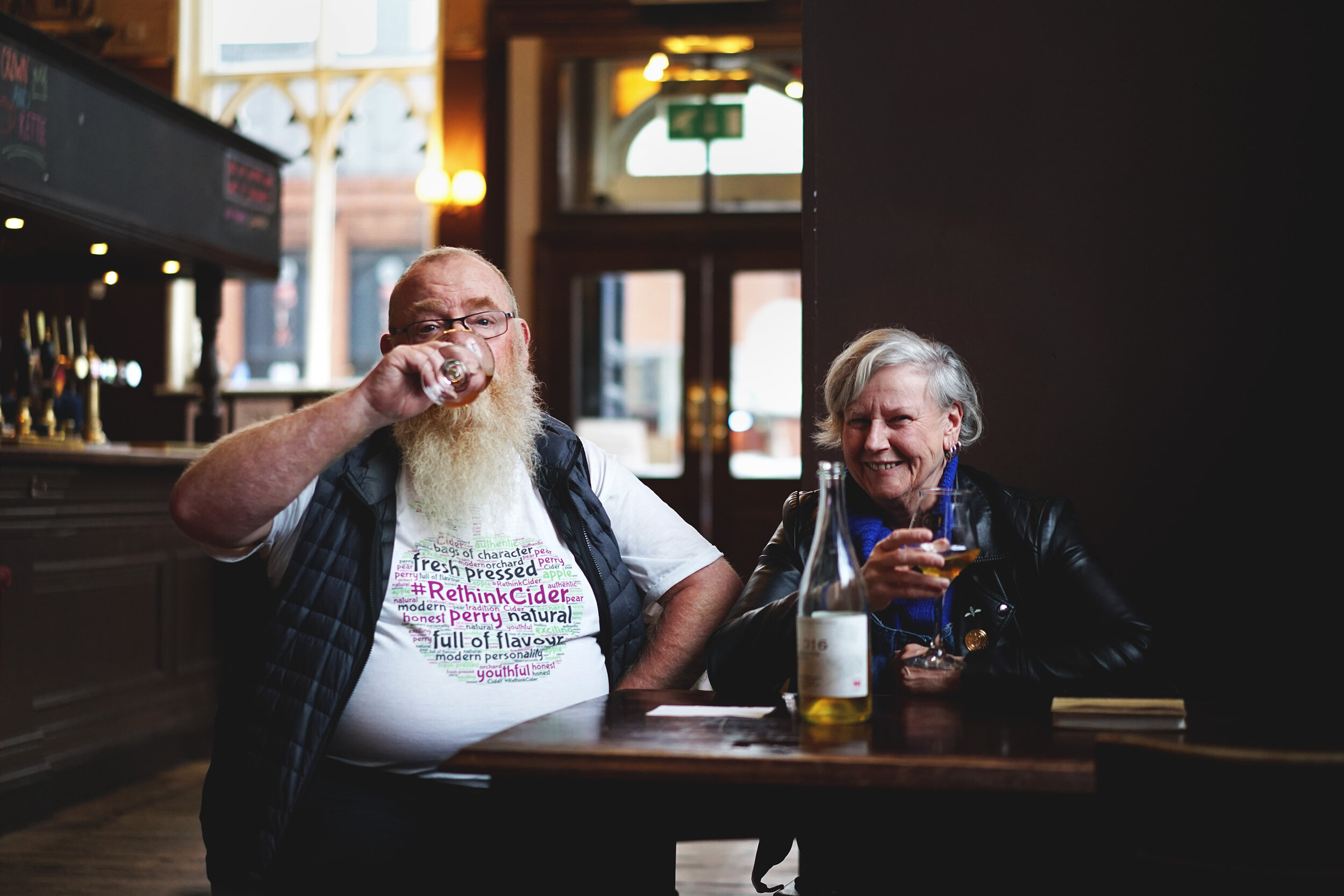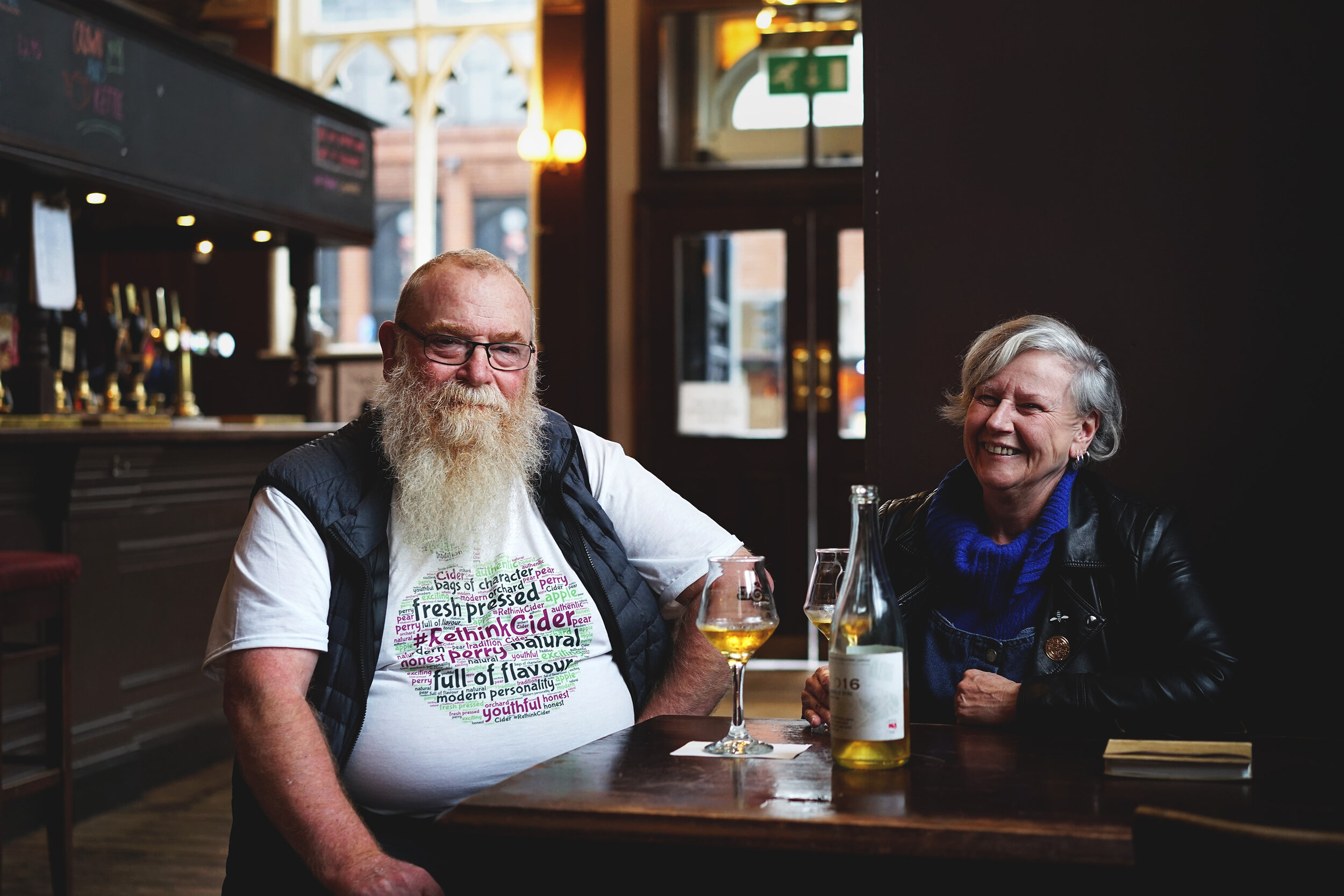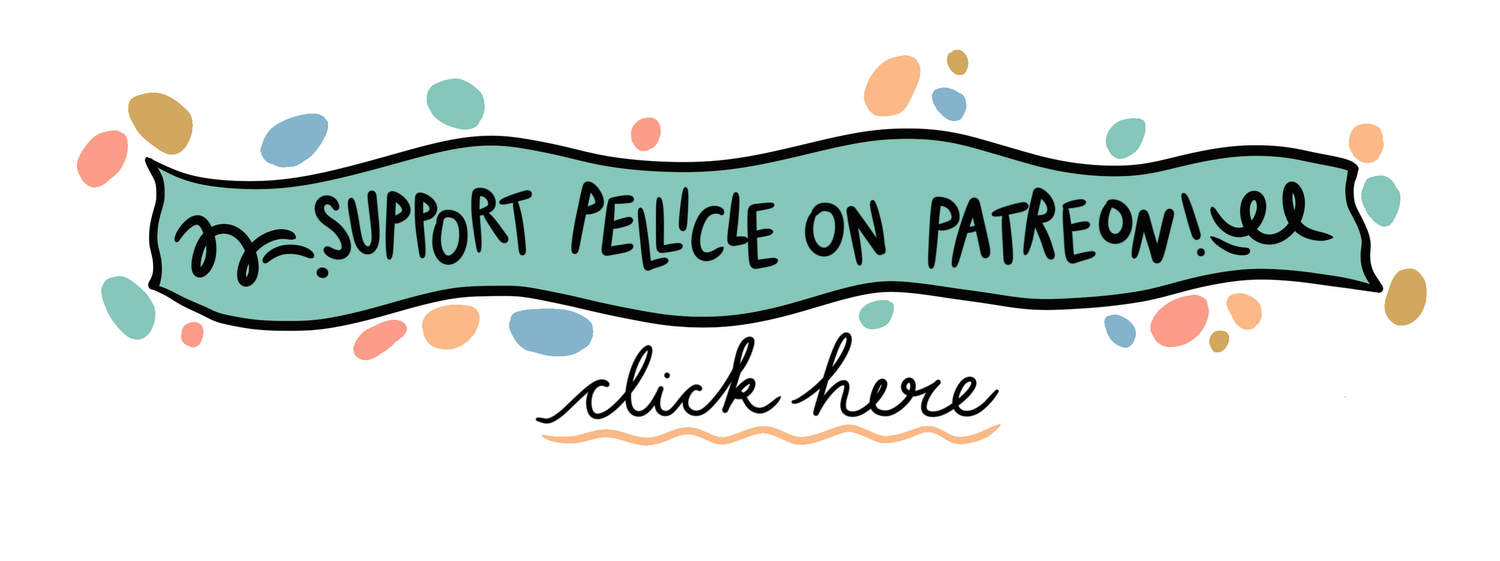Bread For All, And Cider Too — Meeting Cider Activists Dick Withecombe and Cath Potter
Dick Withecombe arrived in Manchester during the politically-turbulent 70s. A farmer’s son from Devon, a former scholar, postman (“I loved that job,” he tells me) and then a teacher, Dick was immediately enamoured with the kindness of his new neighbours and the activism he quickly included himself within. But at what cost? He’d left his beloved cider behind.
“I’ve never lived in a city I’ve loved so much,” he says through his trademark white-blonde beard, and when your gaze meets his sky blue eyes, you believe him. “People care for you here, and they care for each other. But there was a lot of crap to drink.”
Photography by Matthew Curtis
In 1980, keen political activist Cath Potter attended a Manchester Against Missiles protest—one of the many rallies, protests and pickets she was regularly attending at that time. (She shrugged when she told me this; to her, taking part in political demonstrations had always been a necessary part of life.) Without realising it, this was the first time she met her partner-to-be Dick; he was one of the organisers. Weeks later, friends paired them up, and now, nearly 40 years and many shared causes later they remain a steadfastly supportive team.
Cath is still the sort of woman who likes to rock a political t-shirt. These days, however, they’re likely to focus instead on the intricate politics of the drinks industry than matters of state. A newly-qualified pommelier (a sommelier for cider specialising in cider styles and food pairings), today her shirt tells me to “Drink More Perry”.
“We’ve retired from politics,” Dick says, as Cath nods along emphatically. Evidently, this has only given them more time to redouble their activist efforts in Manchester’s food and drink scene.
With Dick and Cath leading the march, Greater Manchester has become the centre of “real” cider in the North in the space of two years. Together, they created the Manchester Cider Club, and in doing so have brought cidermakers like Tom Oliver, Albert Johnson (Ross-on-Wye) and Susanna and James Forbes (Little Pomona) to the city. At regularly sold-out ticketed events and inclusive meet-ups, they are encouraged to answer questions and share their cider with a new, northern audience.
It’s thanks to their passion, commitment and their ubiquitous presence that Manchester is embracing cider. City centre bars like the Crown and Kettle and The Smithfield Tavern now champion real, low intervention ciders, holding them with as much esteem as headlining craft beer counterparts like Marble, The Kernel, Cloudwater and Wander Beyond. Greater Manchester has become a vital part of the cider and perry world’s fruit-centric universe, and while Dick might evade my point, Cath prods him to admit it.
“I suppose we have been mostly to blame,” he relents.
***
Katie Mather: First of all, I’ve got to ask: Why Manchester?
Dick Withecombe: One of us did a tweet describing Manchester as a cider desert about two years ago.
Cath Potter: It weren’t me!
DW: It was hard work being a cider drinker in Manchester, and we’d thought of ways to improve it. So we made an action plan.
CP: You can’t just pick a pub in Manchester and say, this is a nice pub, we’ll do it there. We had to have a plan.
DW: We decided that we wanted to maintain promoting Hogan’s because they’d opened the door for promoting craft cider in Manchester, and we also decided to focus on promoting Ross-on-Wye and Little Pomona as ciders we would try to bring to Manchester.
CP: And it’s not just about bringing ciders up to Manchester from elsewhere, it’s also helped to get the local cidermakers like Dunham Press and Moss Cider break into different places. Once a bar decides that they want to stock quality ciders, they also want to be able to say: “look, we’ve got local stuff too.”
““It offends me that cider is just seen as a rustic unfashionable thing, when I know it’s such a superb product.””
KM: Why did you choose to champion those particular cidermakers?
DW: In Jeff Alworth’s “Cider Made Simple” he recounts an evening with Mike [Johnson], the owner of Ross-on-Wye. He asks him what makes a great cider and he replies “...you have to make it mellow and balanced and reflective of the apples you’re growing in your orchards.” And that connected with me because he had a philosophy.
CP: Ross-on-Wye also run these cider clubs where cidermakers and cider lovers go and bring their ciders or come to taste it and it’s just inspirational. The last one we went to had 100 people there, all cidermakers and drinkers drinking together and talking about what they were tasting.
DW: It shocked us how young Albert [Johnson] from Ross-on-Wye is; he did their cider tasting session at the Crown and Kettle when he was 24. His ciders are uncompromising, and every apple tastes different every year. And there’s wild fermentation, terroir… he takes in his surrounding elements, and he’s willing to take the time to make it right.
KM: And Little Pomona?
DW: They attend every Ross-on-Wye cider club, and they helped Albert develop the confidence to move his ciders to another degree.
CP: They’re from a wine background so they approach their cider making in a very different way, but what’s interesting is how it’s all converged, and we find Little Pomona and Ross-on-Wye’s different attitudes complement each other really well.
DW: Little Pomona came into cider making new but with specialist techniques—they hand-pick their apples, and they’re really particular about the quality of the fruit they use. Their ciders are really geeky. They’ve done a wild-fermented keg conditioned cider—the first of its kind.
KM: When did you decide to make cider more than just a hobby, and why is it so important to you?
DW: It offends me that cider is just seen as a rustic unfashionable thing, when I know it’s such a superb product. What makes a fine cider? How do you define it? It’s made, in my view, by a cidermaker who’s making the best cider that he or she can possibly achieve, where the decisions involved in making that cider are about making it better.
About five years ago, we did a cider tour of Normandy, Devon and Cornwall. Around the same time, a local group called Operation Farm [a community organisation in Tameside, Greater Manchester, promoting food growing], which has a community orchard, bought a press and a scratter [a device for pulping apples prior to pressing] and organised lessons in cidermaking. We went to those lessons, and we’ve been making cider at home for ourselves ever since.
CP: We’re part of that organisation now, and there’s an annual event at Hyde Park too, where there’s a community orchard and we run their pruning workshops.
KM: How did you realise that you could have an impact on the quality of the cider that was available to you?
DW: From a publicans point of view, if there’s a fault in a beer you can send it back to the brewer. If there’s a fault with a cider, firstly not everyone knows or can identify that it’s a fault. And if you do raise it, the cidermakers say they can’t control how it ends up because how it’s been looked after matters so much. There’s an overwhelming lack of knowledge around.
Some people don’t understand that cidermakers are taking it as seriously as natural wine producers. Many people have asked me, “why is it better?” What I want to put across is that it’s not just about “this drink doesn’t give you hangovers,” it’s about presenting a different type of cider. We take the best ciders we can find, we plonk them in front of people and we say taste it. And that has spurred on a lot of what we’ve done.
KM: Where have you found the most willing activists?
DW: We’ve found that the most adventurous bars that sell the most adventurous drinks are the micropubs. If you were to ask me who are the top 20 cider bars in Greater Manchester, I’d say a good half of them would be micros like Bunbury’s in Bolton, The Grocer’s in Cadishead, Cask and Bottle in Prestwich, and Browtons in Ashton. People who have a passion are the ones who open up micropubs. Drinkers have a direct relationship with them, and they are more responsive to their customers.
KM: This isn’t a for-profit gig, so why do you do it?
DW: When you walk into a bar and you can tell when a bar manager has carefully curated their beer list, it’s a let down when the cider choice is boring. When it comes to beer they know the trends and they’re knowledgeable about the classics. If their cider choice is macro, or just plain standard it shows there’s been no thought put into it. There seems a little bit of carelessness about that, as though the cider drinker hasn’t got good enough taste so doesn’t deserve to be treated as well. We just want them to have the best quality cider so there’s no disconnect. Cider deserves to have that priority.
KM: Tell me about the #rethinkcider hashtag campaign.
DW: We met someone who came up with the idea for the rethink cider hashtag, and that was a catalyst—it gave us exactly the picture of what we wanted. Rethink cider has a powerful message which is: forget about your preconceptions of cider. Give it a new chance.
CP: It’s a two-way message: it’s a way for cider producers to talk to drinkers about what good quality should be and educate them about how it’s made, and it’s also a way for drinkers to tell cidermakers what they want out of cider, and where they want it to go.
KM: What are your biggest obstacles?
DW: The biggest problem we have is distribution. We notice all the time that wholesalers often order the most boring ciders from the good cidermakers. They’re the slowest to modernise, and they’re the ones to order the sweet, medium-sweet ciders when actually the modern customer wants dryish, tasty, interesting modern cider.
““There’s an element that dumbing-down feels more secure, and that trying craft or special ciders feels pretentious.””
KM: How are you and your fellow cider making revolutionaries helping to modernise the industry?
DW: Social media is so vital because it has created a forum where cider drinkers, makers, experts and newcomers can discuss cider together. Through promoting and signal boosting each other online and at events and festivals, cidermakers are more visible than ever.
Setting up quality publications about cider—like Full Juice or Graftwood—has also been important, because their features and photographs change the way people think about cider. Beer and wine writers taking the initiative to write about and support good cider in food and drink publications is also vital to build more excitement and interest about the great cider that’s out there.
Important industry figures like Tom Oliver, and Martin Berkerley [Pilton Cider] are using their platforms to lift up the whole scene at events like Bristol Cider Salon. I also think events like the Three Counties Craft Convention, where 170 cidermakers were there talking about the future of cider, has really helped to support the promotion of good cider. It’s about working together to create a standard of cider—an expectation of the level of quality.
KM: How have you found people’s attitudes towards real cider with regards to its cost and availability?
CP: There’s an element that dumbing-down feels more secure, and that trying craft or special ciders feels pretentious. There’s always been a bit of this in political discourse—that working class people just want the basics. And that we don’t aspire to anything more than that; that we don’t want highbrow stuff.
DW: “White bread and butter.”
CP: But if you give people the choice of good stuff, they’re going to choose it! Of course they are!
DW: Buying a 750ml bottle of low-quality Prosecco to share in Wetherspoons will still cost you around £10-£15, or you can have 750ml of the absolute best quality cider in the world by someone like Tom Oliver, Little Pomona or Ross-on-Wye to share for a tenner in a local, independent bar. That choice just needs to be made available and visible.
KM: What’s the future of good cider looking like to you? Who are you trusting as its custodians?
DW: Can I say something about Generation Z? The media treats them terribly. Who voted Brexit? Who’s more politically active? Who’s more anti-racism? Who’s paying more attention to what they eat and drink? They want to know where their drinks are coming from and they’re far more interested in provenance.
CP: And we need to listen to them. Listen to their ecological arguments, their lower-alcohol arguments, and the fact that they want to be able to visit Ross Cider and walk their orchards when we’re long dead and gone.
DW: Cider’s where beer was ten years ago and in some ways, we can use that as a positive. Cider could do with trying to avoid some of the mistakes beer bloody well made by being male-centric and over-hyped. It has the opportunity to learn from those mistakes right from the start. As Tom Oliver says, “it’s not going to happen overnight, we’re in it for the long haul.”
I think cidermakers should hang out with Gen Z and forget about the rest of the market. They should make cider for them because that’s the long term. Oh, and one more thing: cider and food is going to be huge.






















